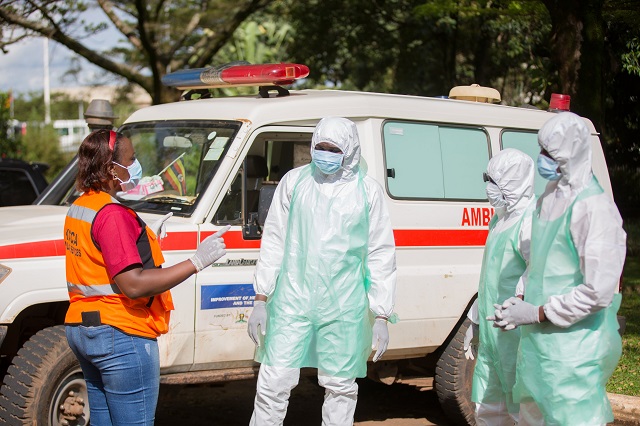
Kampala, Uganda | THE INDEPENDENT | Private health workers want the health ministry to carry out more COVID-19 infection, prevention and control training sessions as the number of positive cases increases.
According to health workers in private health facilities, the training that has been carried out by the health ministry only benefited a few health workers. The medics say most of them did not get face to face training but rather received guidelines on how to handle COVID-19 patients on social media.
The medics now say with the rise in infection numbers, more training is needed because they are at risk of being infected.
Micheal Kiwanuka, a doctor at Goodlife clinic in Namasuba says that he has never received any kind of training.
“We were told we were being trained in August and up to today, I have never received any kind of training. Everyday I see more than 10 patients. I am now scared with the rise numbers in numbers,” said Dr. Kiwanuka.
Grace Ssali, the executive director of the Uganda Healthcare Federation says health workers in private health facilities face a danger of being exposed to COVID-19 yet majority of them have never received any kind of training.
Ssali says that many people working in hospitals rely on public health messages to know what is happening.
The call for training comes at a time when the number of COVID-19 infections in the country are on the rise with an average of 1,300 new cases and deaths reported every week. The rise in cases has exposed health workers with 560 reported infections among health workers.
Ssali says that the lack of enough training has left many members of staff in hospitals at risk. Similarly, Dr. Mukuzi Muhereza, the secretary general of the Uganda Medical Association says the lack of training is leading to poorly trained health workers to being exposed to the disease.
“The issue of health care infections is a complex one that can be traced back to health workers not knowing how to use personal protective wear. They have it but are not using it. Some of them do not even have any experience working with infectious diseases. They do not know what to do and need all the help they can get,” he said.
According to Ssali, less than 1000 health workers have received any kind of training compared to a total number of over 4,000 health workers employed in Kampala Metropolitan. Saali says they want government to help them transfer this information to a format that will make sense to all health workers.
“There’ s need to simplify this information in posters and infographics for easy understanding and reference. We have been pleading for help with this for the last four months but everyone is still focusing on public facilities,” said Ssali.
The health ministry has put a lot of emphasis in managing COVID-19 around on public facilities. Dr. Charles Olaro, the director of clinical services at the health ministry says they are working towards involving private health facilities with COVID-19 care. He says they have begun accrediting hospitals and training health workers on how to handle the the disease.
“We are looking at some private facilities that have applied but even with those ones. Our training policy is to train some health workers who then go and train their colleagues. We cannot afford to hire a hall and invite all health workers in the country to come and undergo training,” said Dr. Olaro.
According to doctors, at the time the health ministry carried out training, Uganda had less than 5,000 recorded cases of COVID-19. Today over 8,000 cases have been recorded. Dr. Andrew Ssekitoleko, the executive director of Lubaga Hospital says that more training is needed to handle the rising numbers of the disease.
“The one off training we received was not enough. We were trained more than three months ago and in this time the disease has changed. It keeps on changing and health workers need to know these changes to better protect themselves,” he said.
******
URN
 The Independent Uganda: You get the Truth we Pay the Price
The Independent Uganda: You get the Truth we Pay the Price






